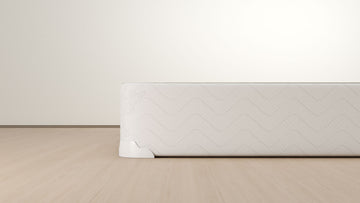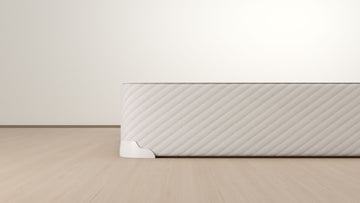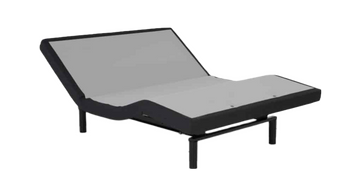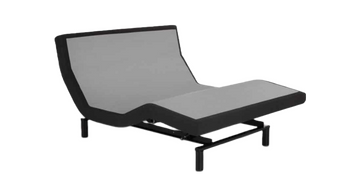Finding the best acid reflux sleep solution
Suffering from Acid Reflux is never enjoyable, which is why finding a suitable solution to those problems is absolutely essential. In the vast majority of cases, an adjustable bed for Acid Reflux will be the best answer, providing noticeable relief for an uninterrupted night’s sleep and a generally better lifestyle.
The most advanced adjustable beds are the result of significant research into symptoms, triggers, and the best positions for Acid Reflux relief. They have the ability to help you finally regain control over your body for a significantly more comfortable future.
Here’s all you need to know about Acid Reflux, adjustable beds, and how they can transform your life for the better.
About acid reflux
At the entrance to your stomach is a valve, which is a ring of muscle called the lower esophageal sphincter. Gastroesophageal reflux disease, or GERD, is a digestive disorder that affects the lower esophageal sphincter (LES), the ring of muscle between the esophagus and stomach.
Many people, including pregnant women, suffer from heartburn or acid indigestion caused by GERD. Doctors believe that some people suffer from GERD due to a condition called hiatal hernia. In most cases, GERD can be relieved through diet and lifestyle changes; however, some people may require medication or surgery.
Some common treatments for GERD include antacids, prescription medications (H2 blockers or proton pump inhibitors), and surgery. However, there are also several lifestyle changes that can help you find relief from your symptoms.
How does GERD impact sleep?
Researchers have figured out several ways in which GERD-related acid reflux interferes with sleep:
1. Most obviously, individuals may be awakened by the pain of heartburn, which occurs when stomach acid refluxes into the esophagus and eats away at the esophageal lining.
2. If acid reflux reaches the back of the throat or larynx, it may prompt a coughing fit or choking.
3. People might wake up when they experience regurgitation, in which a small amount of stomach acid comes up through their esophagus and into their mouth.
4. GERD has been identified as a risk factor for sleep apnea, a disorder in which the person repeatedly stops breathing during the night. Researchers believe that refluxed stomach acid causes the voice box to spasm, which blocks the airways and prevents air from flowing into the lungs.
Unfortunately, many of the mechanisms of sleep make GERD more likely. For example, just the act of lying down increases the risk of acid reflux. When you are in a sitting or standing position, gravity helps keep gastric acid in the stomach. When you lie flat, however, it’s much easier for stomach acid to back flow into your esophagus.
Best and worst sleeping positions with acid reflux
What a good night's sleep looks like with acid reflux
What to look for in an adjustable bed if you have acid reflux
Adjustable base compatibililty
Firmness
Durability
Warranty
Additional sleeping tips for acid reflux sufferers
Don't eat late in the evening
Don't eat late in the evening
Choose an adjustable base
Faqs
How high should you raise your bed for acid reflux
Elevate the head of your bed 6 to 8 inches to assist gravity in keeping your stomach acid from refluxing.
What are the best & worst sleeping positions for acid reflux
After extensive research into the subject, doctors recommend that you:
1. Elevate the head of your bed 6 to 8 inches to assist gravity in keeping your stomach acid from refluxing.
2. Sleep on your left side. This is the position that has been found to best reduce acid reflux.
3. Don't sleep on your back, particularly if you are obese, because the pressure on your stomach could help drive acid into your esophagus.
4. Don't sleep on your right side. For some reason, this seems to prompt relaxation of the lower esophageal sphincter — the tight ring of muscle connecting the stomach and esophagus that normally defends against reflux.
Sleeping tips for acid reflux
Don't eat late in the evening
In a study published in The American Journal of Gastroenterology, a team of researchers found that eating dinner within three hours of going to bed was associated with a sevenfold increase in the risk of reflux symptoms.
As for why three to four hours is the threshold, researchers say that is the amount of time it takes for food to clear the stomach. In chronic heartburn, stomach acid slips into the esophagus, and that’s more likely when lying in bed shortly after a meal, when gravity is not helping to keep digestive juices in the stomach.
The bottom line is that eating more than three to four hours before bed reduces the risk of nighttime acid reflux and heartburn symptoms.
Make Subtle Lifestyle Adjustments
Research shows that the following lifestyle tips can help prevent and manage symptoms too:
1. Avoid tight clothes as they press on your stomach.
2. Don’t exercise too close to eating as it’ll trigger heartburn and GERD.
3. Chew gum to increase saliva production.
4. Quit smoking as nicotine relaxes the esophageal sphincter.
5. Bend from the knees rather than the waist.
Incorporate those ideas to support your new bedtime routines, and noticeable improvements should show.












